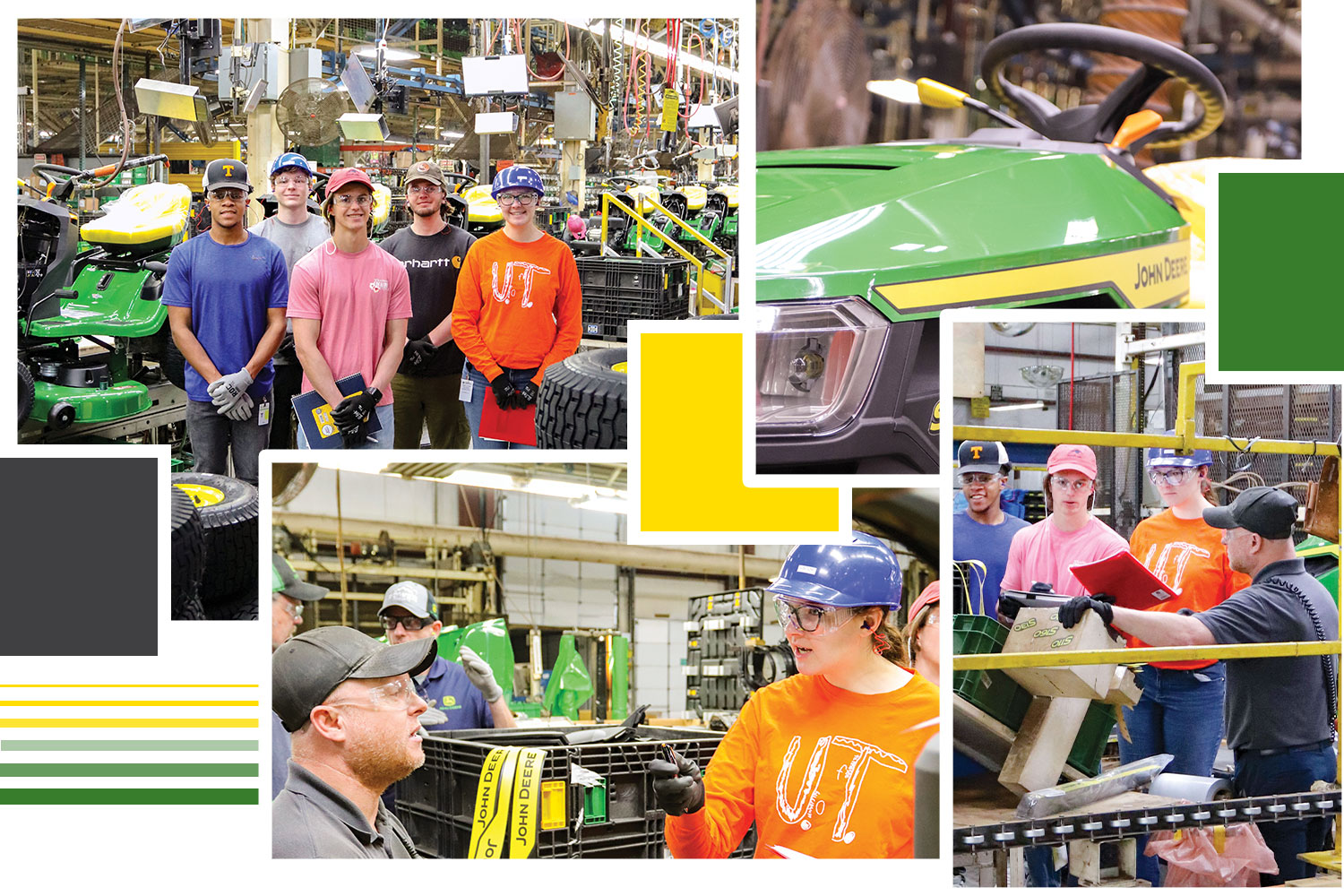Four Student Teams Tackle Four Projects for John Deere
By David Goddard. Photography by Randall Brown.
Senior design projects are a great way for engineering students to tackle a “real-world” challenge during their time on campus, giving them an idea of what they might expect when they enter the work force.
This spring, ISE students and John Deere scaled efforts up massively, with four teams of five students each tackling separate projects for the iconic machinery, heavy equipment, and agricultural tool producer, tackling issues as wide ranging as from manufacturing analytics to the decals that go on the machines themselves.
“Having four student teams working toward their own goals, but as part of an overall effort for one sponsoring company is certainly unique,” said Bill Hicks, who helps pair potential industry partners with student teams. “It has been great watching each individual team come up with solutions to tackle the specific problem they are each trying to improve.”
It’s a situation that has proven beneficial to John Deere as well.
“Initially, I was searching for a regional resource to help facilitate an effort that we were planning at our facility in Greeneville,” said James Carter, John Deere lean project manager. “A Google search took me to the UT Center of Industrial Services, which, combined with fortunate timing, led to an invitation to attend the 2022 Senior Design Showcase. I was highly impressed by the projects that were showcased and the energy and passion the student teams demonstrated when describing their projects, so I immediately began to brainstorm project ideas for our facility.”
Carter said potential projects were ranked based on their business impact and potential for success by student-led teams. He added that John Deere was very intentional about identifying projects where they had tried multiple solutions that failed, and that the concept of having engineering students produce fresh ideas was exciting.
He went on to say that the most significant observation for him was the students’ efforts to gain empathy towards the problem they are trying to solve, that teams made their projects success personal.
“I’ve seen them in our facility on weekends, late evenings through the week, and they never miss a planned meeting or email,” Carter said. “It’s been great to be part of their growth and development over the last two semesters. I speak for all the project champions in that we are going to miss working with this group of students.”
Student Teams
Check out the four teams, and their project goals, as stated by their respective team captains:
ER Optimizer
Team Captain: Kaitlyn Daniels
Team: Hesham Ahmad, Kaleigh Basillo, Ayla Brown, Gemma Del Buono
Project: Improve the efficiency of employee shift selection process with an updated automatic tool system that takes into account employee preferences and experience for shift type and area.
MFG Analytics Team
Team Captain: Jenifer Rodriguez
Team: Kalpaj Kotta, Paul Mercer, Benjamin Northern, Erin Stone
Project: Create a dashboard that John Deere can use to monitor operator and station performance at their Greenville facility.
Hood Decal Team
Team Captain: Cerys Miller
Team: Wade Goetz, Nick Hassler, Clayton Hiatt, Charlie Sweet
Project: Reduce the number of quality audit points from their decal application process for the riding lawn mower line and, while doing so, maintaining the safety of their employees.
Paint Improvement Team
Team Captain: Garrett Dugger
Team: Nicholas Ditullio, Taylor Gingrich, Adrien Massie, Mackenzie Robinson
Project: Decrease the amount of downtime experienced in stage nine of the paint process, which makes the whole plant have to shut down, costing John Deere money. The lower level goals are to decrease the number of parts that fall into the tank and to get parts out of the tank effectively without having to shut the plant down.
A longer version of this story with a full description from each team’s captain of their project, their plan to meet their goal, their thoughts on the experience, and their thoughts on how senior design projects have impacted their education can be found on ise.utk.edu.
